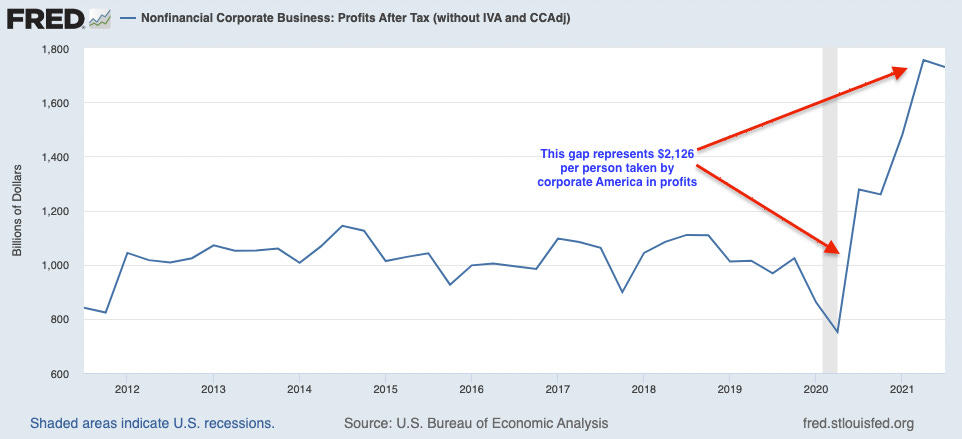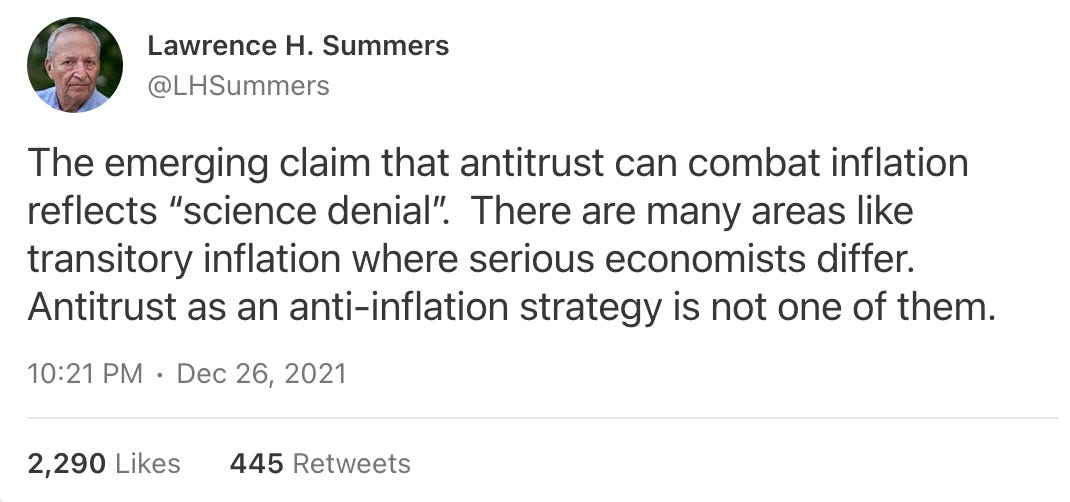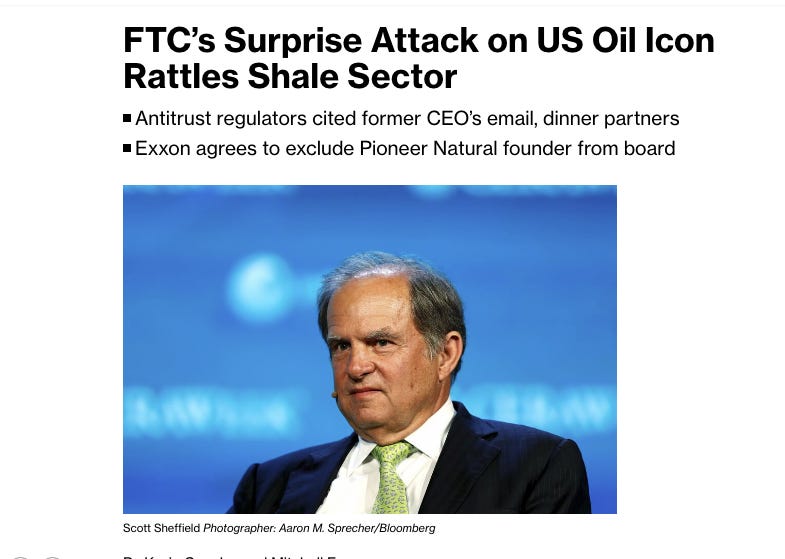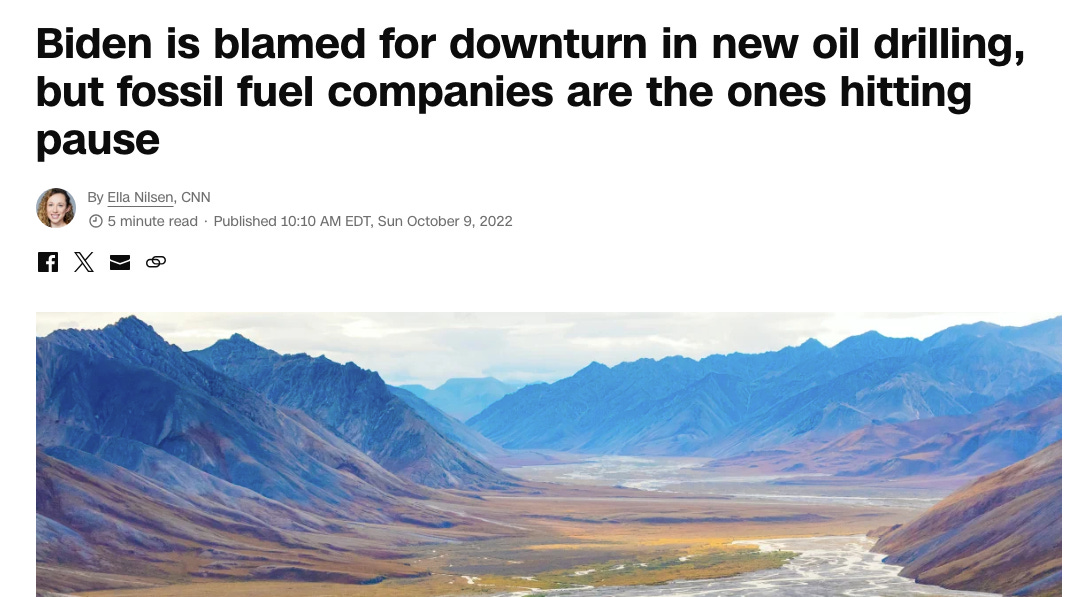An Oil Price-Fixing Conspiracy Caused 27% of All Inflation Increases in 2021
The FTC just found evidence that American oil companies colluded with the Saudi government to hike gas prices, costing the average family $3,000 last year. The question is, what can we do about it?
Welcome to BIG, a newsletter on the politics of monopoly power. If you’d like to sign up to receive issues over email, you can do so here.
I’m at the Google antitrust closing arguments, and I’ll have some thoughts on that soon. But today’s piece is about some bombshell evidence that just came out on a giant post-Covid conspiracy in the oil industry. And I do mean giant, because there’s now evidence that price-fixing in the oil industry alone may single-handedly be responsible for a little over a quarter of the total inflationary increase in 2021.
Let’s dive in.
Last Sunday, I wrote a piece alleging that U.S. shale oil producers colluded with the Saudi government from 2021-2023 to drive up gas prices. That essay was based on some reporting I had done, as well as a complaint from a savvy Kansas City class action law firm, Sharp Law, with special expertise in oil. The theory was that American producers, after a bitter price war from 2014-2016, got tired of competing on price with the Organization of Petroleum Exporting Countries, or the OPEC oil cartel, and at some point from 2017-2021, decided to join the cartel and cut supply to the market. This action had the affect of raising oil prices, costing oil consumers something on the order of $200 billion a year.
Yesterday, the Federal Trade Commission released evidence confirming that collusion played a serious role in hiking oil prices at that time. Pioneer Natural Resources CEO Scott Sheffield, a leader in the fracking field, “exchanged hundreds of text messages with OPEC representatives and officials discussing crude oil market dynamics, pricing and output.” Sheffield was explicit about his goal, saying that “if Texas leads the way, maybe we can get OPEC to cut production. Maybe Saudi and Russia will follow. That was our plan,” he said, adding: “I was using the tactics of OPEC+ to get a bigger OPEC+ done.” He talked to shareholders, publicly threatened rivals, and ultimately achieved output cuts across the industry regardless of price. “Even if oil gets to $200/barrel,” he said, “the independent producers are going to be disciplined.”
By 2021, as the economy roared back from Covid, the independents had joined OPEC. “I don’t think the world can rely much on US shale,” Sheffield said. “It’s really under OPEC control.”
There’s more about Sheffield in the FTC complaint, though a lot is redacted. Investment data bears out what the FTC found, with lower production despite variations in price.
How much did this conspiracy cost the consumer? “We produced too much oil and competed with OPEC,” Sheffield said in 2023. “We actually lowered the price by $20 to $30 per barrel over the past 10 years to the detriment of losing our entire investor base.”
Since the U.S. consumes 7 billion barrels of oil annually, the amount saved by shale oil drillers during their price war with OPEC was $140 billion to $210 billion a year. Once that price war ended, presumably so did the savings. The cost itself is likely a lot higher because pulling shale off the market when demand spiked probably caused prices to increase by much more than $20-30 a barrel. Anyway, we’re talking $500-1000 dollars of extra cost per year to Americans through direct and indirect effects of this conspiracy. This cost shows up most obviously in the form of more expensive gas, but higher oil prices increase the price of everything right down to potato chips because of gas being a primary cost in distribution of goods and services. For a family of four, that’s two to four thousand dollars a year in higher costs.
With these kinds of numbers, it’s likely this conspiracy had macro-economic impacts. In late 2021, I noticed that the increase in corporate profits in aggregate was responsible for 60% of inflationary increases, using this chart and doing a bunch of rough calculations that have since mostly been borne out. The jump in profits in 2021 was about $730 billion, or $2,100 per person.
How do you aggregate just the oil industry? Well, it’s pretty clear that in 2021 and 2022, the industry did fantastically well, with the “the top 25 companies [making] more than $205 billion in profits in 2021,” and an “even more astounding” amount in 2022. Of course, not all profits are due to price-fixing, but $205 billion is just the top 25, not the whole industry. And profits got much much better the next year.
So let’s layer on a rough guess of a $200 billion increase in profits in 2021 that Scott Sheffield implies, which is 27% of the total corporate profit increase that year. That’s a pretty astounding amount, more than a quarter of the total inflationary increase being a result purely of a price-fixing scheme.
In 2021-2022, many populists questioned whether oil companies were engaging in a conspiracy, which triggered intense pushback from economists like Larry Summers that market power as a cause of inflation is a silly theory, and that we needed a recession and cuts to government spending to bring down prices. Remember this comment?
As it turned out, populists were right about corporate profits as a factor in inflation. And now we can see that it’s price-fixing in the specific sector of oil companies that kept prices high.
Whither Antitrust?
Ok, so now let’s talk about why the government uncovered this conspiracy, and what is likely to happen. The context for this investigation was the FTC looking into the $60 billion Exxon-Pioneer merger. And while the FTC did let the merger through, they conditioned it on Exxon disallowing Sheffield from serving on the board of the combined firm or having a role as an advisor after it acquires his company. It’s a pretty aggressive punishment for an executive, to essentially bar him from the corporation he helped build. The industry, especially in the executive suite, is apparently shaken.
Still, the FTC allowed the Exxon-Pioneer merger through, probably because the case would be brought in Texas, the industry is generally supportive of oil mergers, and it’s hard to argue to a judge that a merger would grant market power over the price of oil when the witnesses in the industry don’t support a challenge. The conduct the FTC found is a conspiracy that violates price-fixing law, and the commission should be bringing a charge on that basis, not necessarily based on merger law. Plaintiff lawyers are already bringing price-fixing claims here, and the FTC action just made that case far more likely to draw blood.
There’s also the politics, as these oil mergers are highly contested and partisan. Democrats are skeptical of “Big Oil,” while the Republican coalition is built around fossil fuel firms, Wall Street private equity who finance it, and Saudi wealth that benefits from expensive oil. Late last year, 21 Senate Democrats asked the FTC to challenge this spate of oil and gas mergers. Then, a few month ago, 37 Senate Republicans, led by Texas Senator Ted Cruz, sent a letter demanding the FTC stay out of the industry’s merger spree, as that merger spree would, in their view, raise production.
Within the commission, it was obviously a big deal. The settlement from the FTC kicking Sheffield off the board was a 3-2 commission vote that similarly broke down on party lines. FTC Chair Lina Khan, Commissioners Alvaro Bedoya and Rebecca Kelly Slaughter all issued separate statements, whereas Republicans Andrew Ferguson and Melissa Holyoak issued a joint dissent. Everyone agreed that the conduct of Sheffield was concerning, and Slaughter, Holyoak, and Ferguson called for a potential price-fixing suit.
Ferguson and Holyoak argued the merger itself was fine, and the board position had nothing to do with the combination. There was an odd bit where they lauded Exxon’s ‘wise’ decision to not put Sheffield on the board. Bedoya, in his statement, rebutted this by pointing out that Exxon was going to put Sheffield on its board until the FTC acted. Khan’s argument was simple; when executives say they are trying to collude, regulators should have ‘regulatory humility’ and believe them.
At any rate, this decision is a bit of a muddle. An oil CEO, a legend and decision-maker in the industry, got personally punished for price-fixing. That’s good. But a big merger went through, though it is relatively small in the global context. Still, the muddle is inherent, as there’s just no way to fix a harm that was so vast and far-reaching.
So what happens now? Well fortunately there already is a private antitrust price-fixing suit, and it just got a huge boost from the FTC’s release of its complaint. That means years of litigation against not just Pioneer but seven different shale oil producers. Additionally, the FTC could bring actual monopolization claims against the shale producers, but that’s probably contingent upon a second Biden term, an uncertain proposition. And even with that possibility, we’re going to run into the same problem we see with all of antitrust, which is that it takes forever.
Finally, there’s also likely to be some sort of political reaction, considering it’s an election year, and this is pretty good evidence that oil firms helped collude with Saudi Arabia to steal thousands of dollars from each American family. I can see Congressional proposals to fund oil-specific antitrust investigations, special rules proposed to prohibit communications with OPEC, or even pushing the Federal Reserve to start looking into the relationship between price-fixing and inflation. In 2022, the Biden administration pleaded with oil firms to invest in drilling more to bring down the price of oil, but they refused, claiming it was Biden environmental policies that were the cause of their low investment.
The environmental constraints bit was in retrospect an obvious lie. And even the war in Ukraine, it turns out, was likely just an excuse for what was really going on, which was price-fixing. Americans were skeptical of big oil, and their instincts were correct. It really was a conspiracy against us by a small group.
That said, even if all of these suits worked out, and the political proposals enacted, it wouldn’t be enough. There’s no way to make Americans whole for what oil executives did, but there needs to be a real penalty for schemes of this magnitude. What should happen is handcuffs, en masse, for every executive that set up the American branch of OPEC. Will that happen? I doubt it. But it should.
Regardless, macro-economists should stop ignoring the dynamics of specific markets. Reality, as it turns out, matters.
Thanks for reading! Your tips make this newsletter what it is, so please send me tips on weird monopolies, stories I’ve missed, or other thoughts. And if you liked this issue of BIG, you can sign up here for more issues, a newsletter on how to restore fair commerce, innovation, and democracy. Consider becoming a paying subscriber to support this work, or if you are a paying subscriber, giving a gift subscription to a friend, colleague, or family member. If you really liked it, read my book, Goliath: The 100-Year War Between Monopoly Power and Democracy.
cheers,
Matt Stoller







While BIG reports on the Saudi-shale producer collusion over oil output, the NYT features an article entitled "Israel and Saudi Arabia are Trading Places," (https://www.nytimes.com/2024/05/02/opinion/israel-saudi-arabia.html) in which Tom Friedman reports on a mutual defense treaty being negotiated between the U.S. and Saudi Arabia that also requires the Saudis to initiate a peace deal with the Israelis. It is to be lamented that our government continues to treat Saudi Arabia as its most favored foreign cousin, while the Saudis, earning none of that respect, steal and plunder from their American cousins.
I moved to Kansas from Chicago burbs 2 years ago. It's amazing to me that the R's here continue to hold a supermajority in the state. Koch money (oil) everywhere (Wichita based) trying to suppress any government spending, supress wages, and spinning up calamatous consequences if trickle down isn't adhered too. The wages here are low, too low to live decently on, and social services almost non existent. Recently the Speaker of the KS House (Hawkins (R)) was on a dog and pony show trying to convince everyone that medicaid expansion would devestate the local economy, in spite of the most recent polls showing 67% of KS residents favor it. Yet, they stiill re-elect these morons by huge margins. I can see it now, they'll spin this story as big government attempting to impede the progress of big oil, who's trying it's best to make everyones life better. And these Fox News immersed idiots will buy it. Moving to Wisconsin in 2 weeks, and that's not soon enough.